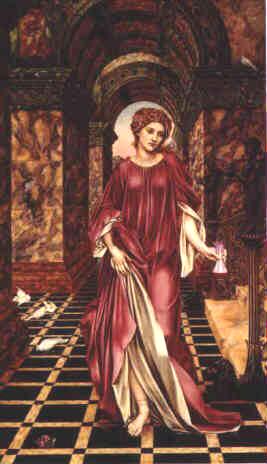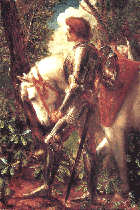Isabella was named the Catholic Queen or the Law and Order Queen by the pope because of her great devotion to religion and politics which won her great popularity.
Her motto was, "One king, one law, one faith." She was an ambitious ruler who promoted education, religion, and the arts. She imposed religious authority, one example would be the Spanish Inquisition.
Isabella was the only daughter of Juan II of Castile and Leon. He died when she was only three years old and Isabella was taken to live with her brother Alfonso and her step-brother Enrique, who recognized her as his heir.
She was tutored by monks by which she learned poetry, music, philosophy, sewing, and horseback riding. Enrique wanted her marriage to strengthen his position but she refused all arranged marriages. In 1469, Isabella married her second cousin Ferdinand by choice even though they had only known each other four days. Ferdinand was the heir to the throne of Aragon and they planned to be joint rulers. They kept their marriage a secret for three years until Enrique found out and she was exiled. He removed Isabella's name and disinherited her.
Isabella was sent to live with her mother in a small castle in Arevado. This split Castile into opposing camps and nearly brought on civil war. In 1474, Enrique died without appointing an heir so Isabella had herself appointed ruler. Enrique's daughter, Juana La Beltianeja contested.
Juana received help from Alfonso V of Portugal in the civil war that followed. The war ended in 1476 at Toro with the defeat of the Portuguese.
In five years Ferdinand became king of Aragon and the consolidation of their joint reign was cemented by the birth of their son Juan, the first of five children. Although they ruled separately, they fought together in the battle against the Muslims which they eventually won in 1492.
When Isabella was born, Spain was divided into three provinces. Her first priority as queen was to break the power of the lawless Castilian nobility and assert royal authority. To accomplish this, she revived the Hernandad or brotherhood. The hernandad was an armed peace keeping association made up of rural constabularies and judicial tribunals, which were both under royal jurisdiction.
Isabella took control of the religious military by making Ferdinand the master. This mix of royal, military, political, and economic strength allowed Isabella and Ferdinand to start a long awaited crusade. A crusade to drive the Moors out of Spain by retaking control of the Moorish stronghold of Granada. Despite the fact that she was pregnant, Isabella supervised the battles.
After eleven long years of fighting their efforts were finally rewarded and Granada fell in 1492. For the first time in over 800 years, Spain was united into one country and the Spanish people viewed her as a symbol of the countries unity and purpose. The Spanish Inquisition was also created in 1492. It was prompted by Isabella's devotion to religious authority and it was established under royal control.
Turquemander, who was Isabellas own confessor, was appointed "Grand Confessor". He targeted Moors, Moorish converts that were suspected of changing back, and Jews who were forced to convert or leave Spain. The intention of the Spanish Inquisition was to help create social stability and religious purity. This goal was reached but at a considerable cost. Some 2000 people lost their lives because of the inquisition findings and 1000s more became homeless.
After the conquest at Granada, Isabella agreed to finance Christopher Columbus's quest. Isabella's vision for Spain included world expansion that began with these voyages which opened up a new realm of Spanish Influence. He wanted to find a passage to the far east but he ended up discovering the new world, a.k.a America. This made the nation the undisputed leader in global exploration, a world power.
She forged a nation and a national character. Isabella left a legacy for the good and ill at home and in the America's for centuries to follow. In 1504, Isabella died and left her kingdom to her son Juan who would also inherit Aragon when Ferdinand died.






